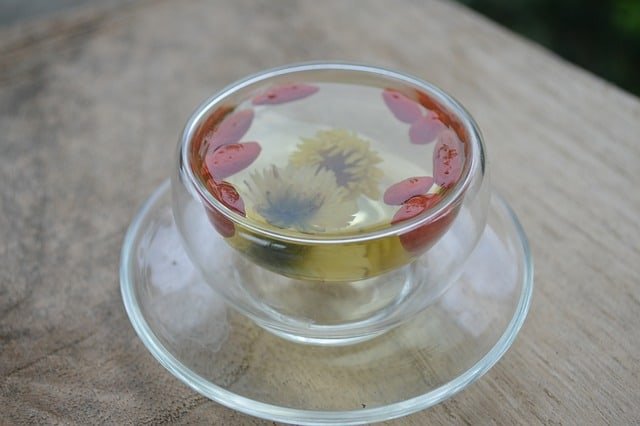
Chrysanthemum tea has gained popularity not only for its delicate and refreshing taste but also for its potential health benefits. One of these benefits is its potential to alleviate headaches. Traditional Chinese medicine has used chrysanthemum tea for centuries to treat a range of conditions, including migraines and tension headaches.
This floral tea is known to have anti-inflammatory properties, which may help in reducing inflammation associated with headaches. In addition, it is often used to reduce stress, and provide relief from eye irritation and allergies. Ready to learn more about how chrysanthemum tea may be beneficial for headaches? Let’s dive in.
The Benefits of Chrysanthemum Tea
Chrysanthemum tea is known for its various health benefits, which contribute to its popularity among tea enthusiasts. One of the primary advantages of this herbal tea is its ability to reduce blood pressure. Incorporating chrysanthemum tea as part of a healthy diet and lifestyle can contribute to improved cardiovascular health.
Aside from its positive effects on blood pressure, chrysanthemum tea is also recognized for its ability to promote deep relaxation. Drinking this tea can help alleviate stress and anxiety, enhancing one’s overall mental well-being. In addition, it provides a natural way to boost immunity, which is crucial for maintaining good health and preventing illnesses.
Here are some other notable benefits of chrysanthemum tea:
- Rich in antioxidants, which help protect the body against free radicals
- Anti-inflammatory properties that may help reduce inflammation and pain
- Potential support for eye health, especially for those with vision problems
- May aid in digestion and reduce symptoms of indigestion and bloating
Lastly, it is important to note that while chrysanthemum tea offers numerous health benefits, it should be consumed in moderation, as excessive consumption can lead to allergies and side effects in some individuals.
Chrysanthemum Tea and Headache Relief
Chrysanthemum tea is a traditional remedy in Chinese medicine, known for its “cleaning heat and toxin” and “scattering cold” properties. It has been used to treat various ailments, including eye pain and symptoms associated with headaches.
How It Works
The specific components in chrysanthemum tea that help combat headache symptoms are unclear. However, some experts believe that its cooling and anti-inflammatory properties may provide relief from headache pain.
Potential Side Effects
While chrysanthemum tea is generally well-tolerated, it’s important to note that some individuals may experience side effects such as:
- Allergic reactions
- Dizziness
If you’re allergic to the Asteraceae/Compositae family of plants, which includes chrysanthemums, you should avoid drinking this tea.
Precautions
Before including chrysanthemum tea in your headache-relief regimen, consider the following precautions:
- Consult a healthcare professional if you’re pregnant or breastfeeding, as the safety of chrysanthemum tea during these periods is not well-established.
- If you’re currently taking medications, consult with your doctor to ensure that chrysanthemum tea does not interact with your medications.
How to Make Chrysanthemum Tea
Chrysanthemum tea offers numerous benefits, including potential relief from headaches. To enjoy this delicious beverage, follow these simple steps:
Choosing the Right Ingredients
Begin by selecting high-quality dried chrysanthemum flowers. These can be found at specialty tea shops, Asian supermarkets, or online. Choose whole flowers, as they slowly release a wealth of nutrients into the infusion, creating a more flavorful and healthful tea.
Brewing Instructions
Here are the steps to make chrysanthemum tea:
- Place around 8-10 dried, whole chrysanthemum flowers in a teapot or cup.
- Boil water to approximately 200°F (93°C) and pour it over the flowers.
- Allow the flowers to steep for at least 5 minutes, but you can steep for up to 15 minutes for a stronger flavor.
- Strain the tea into a teacup, discarding the flowers.
For additional flavor, you may consider adding a spoonful of honey or a few goji berries. Sit back, relax, and enjoy your soothing chrysanthemum tea!
Conclusion

In summary, chrysanthemum tea can potentially provide relief from headaches due to its natural anti-inflammatory properties and its traditional uses in Chinese medicine.
While there isn’t significant scientific evidence specifically linking chrysanthemum tea to headache relief, it is still a soothing beverage that may help alleviate symptoms for some individuals. If you’re interested in trying chrysanthemum tea for headache relief, it is relatively easy to prepare at home using dried chrysanthemum flowers.
However, it is important to note that there might be side effects for some individuals, as mentioned. These could include allergies and dizziness.
Always consult with your healthcare professional before trying any new treatment, and remember that each person may respond differently to various remedies. Chrysanthemum tea may be just one of many herbal teas that can potentially provide relief from headaches, so explore various options to find what works best for you.
